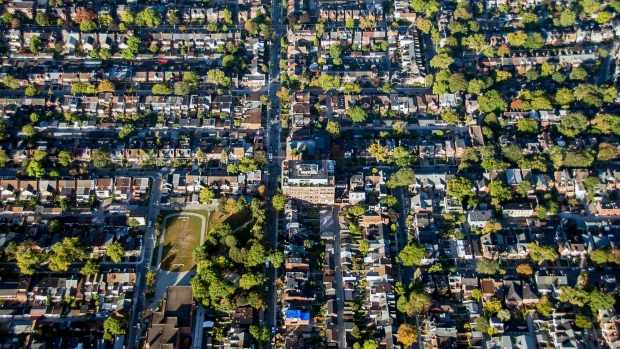Blackstone Strikes $1.6 Billion Student Housing Deal With KKR
Blackstone Inc. agreed to sell a student-housing portfolio to KKR & Co. for $1.64 billion.
Latest Videos
The information you requested is not available at this time, please check back again soon.
Blackstone Inc. agreed to sell a student-housing portfolio to KKR & Co. for $1.64 billion.
Pending sales of existing US homes in March reached their highest levels in a year in spite of persistently high borrowing costs and a low supply.

Whirlpool Corp., the owner of the Maytag and Amana appliance brands, is cutting about 1,000 salaried positions worldwide to reduce costs as slow US home sales limit demand.
Politicians are desperate for developers in Vancouver to build more homes to alleviate pressure in one of the continent’s most expensive real estate markets. There’s just one problem — not enough buyers are showing up.
Creditors to Adler Group SA are set to take control of the company after the embattled landlord struggled to sell assets and repay debts against the backdrop of plunging prices.
Jul 10, 2018

Home prices across Canada are expected to rise in the third quarter after a slower spring, despite deepening economic uncertainty, according to a new report from Royal LePage.
In the report released Tuesday, the real estate firm forecast the aggregate home price in the country will rise 1.9 per cent from the second quarter, following a sluggish first half of the year. Royal LePage’s National House Price Composite is based on data from the country’s 63 largest real estate markets.
“It was a spring market that never blossomed,” Phil Soper, president and CEO of Royal LePage, said in a release.
“As anticipated in our original 2018 forecast, the new federal mortgage stress-test measures slowed the market to a standstill in much of the country, as some families adjusted their expectations in a world with lower borrowing capacity, and others not impacted by the OSFI regulations moved to the sidelines, adopting a ‘wait and see what happens to home prices’ approach.”
Soper said housing activity in most markets will pick up now that these new realities have sunk in.
READ MORE: HOUSING IN CANADA
He noted, however, the cost of borrowing could increase Wednesday when the Bank of Canada releases its next interest rate decision. In addition, Soper said potential buyers who could be directly impacted by uncertainty over the North American Free Trade Agreement and mounting trade war with the U.S. have taken a more cautious approach.
“There is a cloud of uncertainty hovering over our economy and business environment,” he said. “Notwithstanding the economic drag that difficult American trade negotiations are creating, the national housing market is expected to remain in a long-term expansionary cycle, albeit at a slower pace than we have witnessed over the past couple years.”
Royal LePage said third-quarter home prices in the booming Great Montreal market are expected to rise 1.8 per cent to $398,220 from the last quarter, after the home price appreciation in the area surpassed the national aggregate for the first time in seven years in the second quarter.
And while homes in British Columbia remain the priciest in the country, Royal LePage has seen a softening in the Vancouver area amid new lending regulations and recent tax measures implemented by the B.C. government. Even so, the aggregate home price in Vancouver is expected to rise 1.5 per cent to $1,289,120 compared to the second quarter.
Meanwhile, southern Ontario cities outside the Greater Toronto Area are expected to see the highest price increases in the province as buyers move to more affordable areas.
Royal LePage forecasts the highest increase for the third quarter will be in Halifax, where home prices are expected to rise 2.6 per cent to $324,533, driven by low inventory.